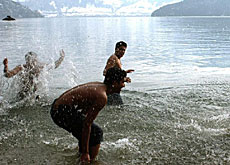
NGOs call for water to remain public good

Non-governmental organisations meeting in Geneva are demanding the creation of a solidarity fund for water to ensure it remains a "universal public good".
The NGOs, attending the Alternative World Water Forum, also called for a “World Water Parliament” to regulate water distribution fairly.
The aim of the forum, according to Bastienne Joerchel of the Swiss Coalition of Development Organisations, is to create a global public water utility.
The NGOs say access to potable water must be declared a human right, and therefore should not be privatised.
In order to reach this goal, the forum – which ended on Sunday – has recommended the introduction of a “solidarity cent”, paid to ensure private capital is not required.
As an example, the Swiss multinational food giant, Nestlé, was accused of controlling 50 per cent of Pakistan’s drinking water, bottling it and selling it at prices only few Pakistanis can afford.
The authors of the study, commissioned by Swiss NGOs and Amnesty International, said that only about 20 per cent of Pakistanis had access to clean drinking water.
They added that Nestlé in one case took the water from an underground source near Lahore, which had led to a drop in the groundwater level, making it difficult for thousands of people to pump water from their wells.
Water parliament
Joerchel said the NGOs expected the first meeting of a “World Water Parliament” to be held next year in Brussels.
The initiatives announced by the alternative forum come just ahead of the United Nations-sponsored “World Water Day” on Tuesday.
It will mark the start of what the UN general assembly has proclaimed the “International Decade for Action”, which will last until 2015.
But the NGOs say the world body’s initiative, which includes an international conference planned for Mexico next year, will be ineffective.
“These [UN-organised] events don’t respond to the fundamental objectives that every human being on the planet has a right to access to water,” said Alberto Velasco, president of the Swiss organising committee behind the alternative meeting.
Switzerland
He is critical of the place that will be accorded to multinationals in Mexico.
Speaking earlier this week, Velasco said people in industrialised countries were as much at risk of having water resources privatised as those in developing nations.
“We see what has happened with electricity in Switzerland,” he said. “The government is against privatisation at the moment, but it may only be a question of time [before it gives in].”
The NGOs believe only public pressure can turn the tide against privatisation, as was the case in Uruguay and Bolivia where people took to the streets and voted to introduce laws forbidding the liberalisation of the sector.
The alternative forum is being run along the same lines at the World Social Forum held earlier this year in Port Alegre, Brazil. The latter demanded an international convention on water.
The Swiss coalition says Switzerland, with six per cent of Europe’s freshwater reserves, has a responsibility to fight privatisation.
swissinfo with agencies
The priorities of the Alternative World Water Forum:
Access to water in sufficient quantities
Water must be treated as a common asset
Public communities have to ensure financing of investments necessary to provide potable water for all
Citizens have to participate in the process
The first alternative forum was held in Florence in 2003.
About 1,000 participants attended the Geneva meeting from March 17 to March 20.

In compliance with the JTI standards
More: SWI swissinfo.ch certified by the Journalism Trust Initiative
















![The four-metre-long painting "Sonntag der Bergbauern" [Sunday of the Mountain Farmers, 1923-24/26] had to be removed by a crane from the German Chancellery in Berlin for the exhibition in Bern.](https://www.swissinfo.ch/content/wp-content/uploads/sites/13/2025/12/01_Pressebild_KirchnerxKirchner.jpg?ver=a45b19f3)










You can find an overview of ongoing debates with our journalists here . Please join us!
If you want to start a conversation about a topic raised in this article or want to report factual errors, email us at english@swissinfo.ch.